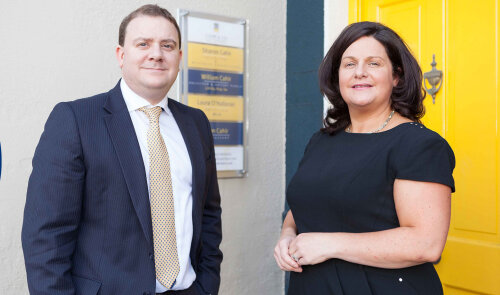Best Same Sex & LGBT Lawyers in Ennis
Share your needs with us, get contacted by law firms.
Free. Takes 2 min.
Free Guide to Hiring a Family Lawyer
List of the best lawyers in Ennis, Ireland
About Same Sex & LGBT Law in Ennis, Ireland
This guide explains key legal issues affecting lesbian, gay, bisexual, transgender and other sexual and gender minority people living in Ennis, County Clare, Ireland. Irish law has changed significantly over the last decade. Same-sex marriage was legalised nationally in 2015 and anti-discrimination protections cover sexual orientation and gender identity. At the same time, family law, parental recognition, assisted reproduction and gender recognition each have particular legal rules that can affect everyday life. Local public services in Ennis are governed by national law, and local support and advice can be found through Clare County services and community organisations.
Why You May Need a Lawyer
People in the LGBT community may need legal help for a variety of reasons. Common situations where a solicitor can help include:
- Family law matters, such as marriage, separation, divorce and child custody or guardianship disputes.
- Adoption and parental rights following donor-assisted conception, co-parenting arrangements or surrogacy.
- Issues arising at work, including discrimination, harassment or unfair dismissal based on sexual orientation or gender identity.
- Problems accessing healthcare or disputes about gender-affirming medical treatment or recognition.
- Immigration or residency questions for non-Irish partners and spouses.
- Criminal matters, including reporting hate incidents, harassment or threats to personal safety.
- Wanting guidance on wills, inheritance, cohabitation agreements and financial planning for couples who are not married.
Solicitors can explain legal options, represent you in court or tribunals, negotiate settlements and help you understand the likely outcomes and costs.
Local Laws Overview
Below are the key aspects of Irish law most relevant to LGBT people in Ennis. These reflect national legislation and how it operates locally.
- Marriage equality: Since the 2015 referendum same-sex couples may marry and have the same legal rights and obligations as different-sex couples. Marriage law, divorce and property rules apply equally.
- Family and parental rights: The Children and Family Relationships Act 2015 and subsequent legal developments provide routes for parental recognition, but parentage can be complex in donor conception and surrogacy cases. Same-sex couples can adopt jointly, but legal steps may be required to establish parentage for non-biological parents.
- Gender recognition: The Gender Recognition Act 2015 allows adults to change the legal gender recorded on official documents through a statutory process. The area of legal recognition for minors has been the subject of ongoing debate and proposed reform.
- Anti-discrimination protections: Employment Equality Acts and the Equal Status Acts prohibit discrimination on the grounds of sexual orientation and gender identity in employment, education, access to goods and services, and housing. Employment disputes are typically handled through the Workplace Relations Commission.
- Hate crimes and public order: Criminal law recognises hostility based on sexual orientation or gender identity as an important factor in assessing and prosecuting offences. Incidents can be reported to An Garda Siochana and may be treated as aggravating factors in sentencing.
- Healthcare and gender-affirming care: Public and private healthcare services are available, but access and waiting times for specialist services vary. Consent and confidentiality rules apply. Legal advice can help where disputes arise with providers or where consent for minors is contested.
- Immigration and residency: Spouses in same-sex marriages are recognised for immigration and residency purposes. Non-EU partners may require visas or residence permission and should seek legal advice on applications and family reunification.
- Surrogacy: Ireland does not yet have a full regulatory framework for surrogacy. Intended parents may need court orders to be recognised as the childs legal parents. Legal advice is essential before entering any surrogacy arrangement.
Frequently Asked Questions
Can I get married in Ireland if I am in a same-sex relationship?
Yes. Same-sex marriage has been legal across Ireland since the 2015 referendum. Couples who marry have the same legal rights and responsibilities as different-sex couples, including on divorce, pensions and property.
If my partner and I raise a child, will both of us be recognised as parents?
Recognition depends on how the child was conceived and the legal steps taken. For children born through donor-assisted conception, parentage for the non-biological parent may require formal steps such as guardianship, adoption or other court-based procedures. If you are unsure, seek legal advice early to ensure parental rights are established.
How does the law treat surrogacy?
Surrogacy is not comprehensively regulated in Ireland. Intended parents usually need a court order to be legally recognised as the childs parents. Surrogacy arrangements can raise complex legal, medical and ethical issues, so obtaining specialist legal advice before proceeding is essential.
How can I change my legal gender in Ireland?
Under the Gender Recognition Act 2015 adults can change their legal gender through a statutory process. The procedure involves making a formal application and declaration. The rules for minors are more restricted and have been the subject of review. A solicitor experienced in gender recognition can guide you through the process and paperwork.
What protections exist if I face discrimination at work because of my sexual orientation or gender identity?
Irish employment law prohibits discrimination and harassment on the grounds of sexual orientation and gender identity. You can raise complaints internally, or bring a claim to the Workplace Relations Commission. A lawyer can help assess the strength of a claim, advise on remedies and represent you in proceedings.
What should I do if I face harassment or a hate incident in Ennis?
If you feel threatened or are in danger, contact An Garda Siochana immediately. For non-emergency incidents, you can still report to the Gardaí. Document the incident, collect witnesses details and seek support from local LGBT organisations. A solicitor can advise on civil remedies, protective orders and reporting procedures.
Can a same-sex couple adopt a child in Ireland?
Yes. Same-sex couples are eligible to adopt in Ireland. The adoption process involves assessment by the relevant authorities and follows the same legal criteria applied to all prospective adoptive parents.
How are immigration and residency rights affected by a same-sex marriage?
Same-sex spouses are recognised for immigration and residency purposes under Irish law. The specific route and documents required depend on your nationality and immigration status. Non-EU partners should get early legal advice to prepare visa or residence applications and to understand timelines and entitlements.
Are there free or low-cost legal supports available locally?
Yes. Citizens Information centres offer free information about rights and procedures. The Legal Aid Board may provide legal aid and advice where you meet eligibility and means tests, particularly in family law matters. Community and charity organisations may also offer limited legal clinics or referrals.
How do I find a solicitor experienced in LGBT issues in Ennis?
Look for solicitors with expertise in the relevant area - family law, employment, immigration or criminal law. Ask prospective solicitors about their experience with LGBT clients and similar cases. You can contact local law firms in Ennis or nearby larger centres like Limerick or Galway. The Law Society of Ireland maintains a directory of solicitors and you can request an initial consultation to assess fit and fees.
Additional Resources
Below are types of organisations and public bodies that can help with information, support and legal matters in Ennis and across Ireland:
- Citizens Information Centre - for free, impartial information about rights and public services.
- Legal Aid Board - for information on eligibility for legal aid and representation in certain cases.
- Workplace Relations Commission - for employment-related disputes including discrimination and harassment.
- An Garda Siochana - to report crimes, threats or harassment and to seek protection.
- Irish Human Rights and Equality Commission - a national body that promotes equality and can provide policy information.
- National and specialist LGBT organisations such as youth support groups, transgender support networks and national helplines that provide advice, advocacy and peer support.
- Local community groups in County Clare and Ennis - which can provide practical and emotional support and often have up-to-date information on local services.
Next Steps
If you need legal assistance related to same-sex or LGBT matters in Ennis, consider the following practical steps:
- Gather documentation - collect any relevant documents such as birth certificates, marriage or civil partnership certificates, correspondence, employment records, medical records and evidence of incidents.
- Identify the legal area - determine whether your issue is family law, employment, immigration, criminal or health related. This will help you choose the right solicitor.
- Contact free information services - speak first to the Citizens Information Centre in Ennis or a national LGBT support organisation to clarify your rights and options.
- Seek a solicitor with relevant experience - ask about fees, initial consultation policies and experience with LGBT cases. If cost is a barrier, ask about legal aid eligibility or pro bono clinics.
- If you are at risk - call the Gardaí in emergencies. For non-emergencies, consider obtaining a protection order or other immediate civil remedies with legal help.
- Keep records - maintain a clear record of incidents, communications and legal steps taken. This will strengthen any formal complaints or court applications.
Getting specialist legal advice early can make a significant difference to outcomes. Solicitors experienced in LGBT law can explain your options, the likely timeline, and the costs involved, and can represent you throughout the process.
Lawzana helps you find the best lawyers and law firms in Ennis through a curated and pre-screened list of qualified legal professionals. Our platform offers rankings and detailed profiles of attorneys and law firms, allowing you to compare based on practice areas, including Same Sex & LGBT, experience, and client feedback.
Each profile includes a description of the firm's areas of practice, client reviews, team members and partners, year of establishment, spoken languages, office locations, contact information, social media presence, and any published articles or resources. Most firms on our platform speak English and are experienced in both local and international legal matters.
Get a quote from top-rated law firms in Ennis, Ireland — quickly, securely, and without unnecessary hassle.
Disclaimer:
The information provided on this page is for general informational purposes only and does not constitute legal advice. While we strive to ensure the accuracy and relevance of the content, legal information may change over time, and interpretations of the law can vary. You should always consult with a qualified legal professional for advice specific to your situation.
We disclaim all liability for actions taken or not taken based on the content of this page. If you believe any information is incorrect or outdated, please contact us, and we will review and update it where appropriate.










